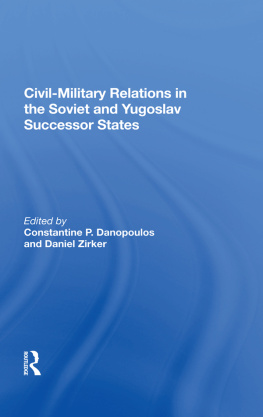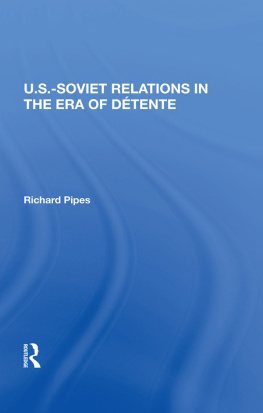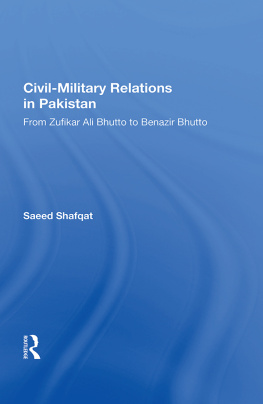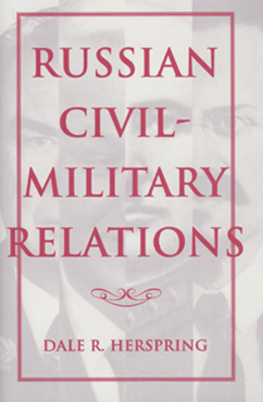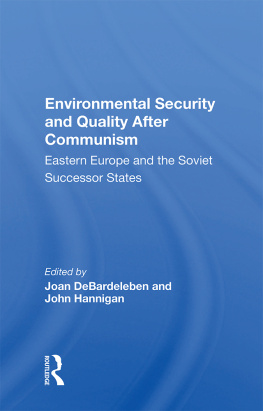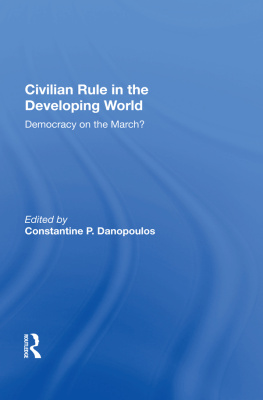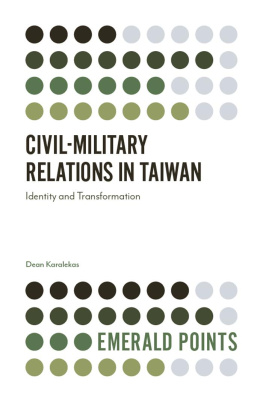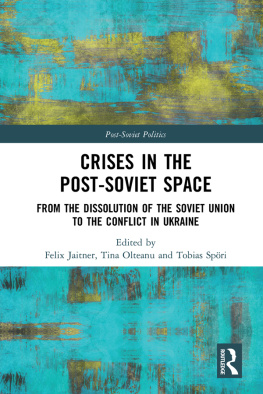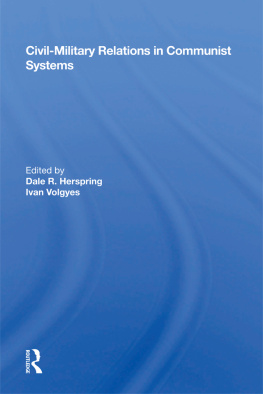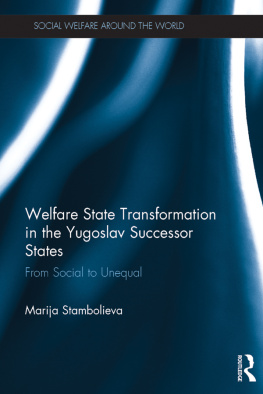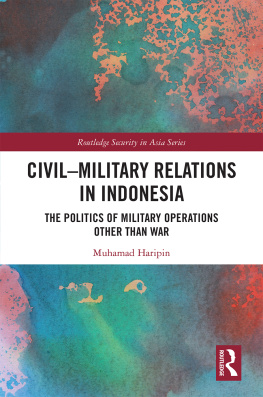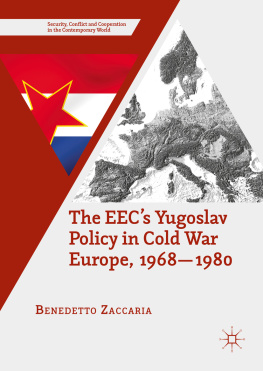First published 1996 by Westview Press
Published 2018 by Routledge
52 Vanderbilt Avenue, New York, NY 10017
2 Park Square, Milton Park, Abingdon, Oxon OX14 4RN
Routledge is an imprint of the Taylor & Francis Group, an informa business
Copyright 1996 by Taylor & Francis
All rights reserved. No part of this book may be reprinted or reproduced or utilised in any form or by any electronic, mechanical, or other means, now known or hereafter invented, including photocopying and recording, or in any information storage or retrieval system, without permission in writing fromthe publishers.
Notice:
Product or corporate names may be trademarks or registered trademarks, and are used only for identification and explanation without intent to infringe.
Library of Congress Cataloging in Publication Data
Civil-military relations in the Soviet and Yugoslav successor states /
edited by Constantine P. Danopoulos and Daniel Zirker.
P cm.
Includes bibliographical references and index.
ISBN 0-8133-8846-5 (hardcover)
1. Former Soviet republicsArmed ForcesPolitical activity.
2. Civil-military relationsFormer Soviet republics. 3. Civil
-military relationsMacedonia (Republic). 4. Civil-military
relationsSlovenia. 5. Civil-military relationsCroatia.
6. Civil-military relationsBosnia and Hercegovina.
I. Danopoulos, Constantine P. (Constantine Panos) II. Zirker,
Daniel.
UA770.C654 1996
322'.5'0947dc20
95-37948
CIP
ISBN 13: 978-0-367-01692-0 (hbk)
It is nothing less than astonishing how little recent contributions to the theory of democracy have had to say about military and civil-military relations. A cursory glance at a representative sample of texts would reveal that it is possible to write a lengthy and learned volume on democracy and never even mention the existence of this profoundly undemocratic institution in its midst. Ironically, most of this work has been produced by Americans during the post-World War II period when the United States dedicated hitherto unprecedented public resources to military expenditures, developed a massive military-industrial complex that sustained and distorted its economy, regularly conscripted a sizable proportion of its youth, fought almost continuously in wars beyond its borders, and ultimately provoked a level of massive civil disobedience that permanently altered the domestic balance of its political forces.
And yet in the efforts of such scholars as Seymour Martin Lipset, Robert Dahl, Maurice Duverger, Giovanni Sartori, Arend Lijphart, Roland Pennock, Michel Crozier, Samuel Huntington, Joji Watanuki, William Riker, Gabriel Almond, Sidney Verba, and G. Bingham Powell, Jr. just to cite the most prominent examples to explain the nature of modern democratic polities, there is virtually not a word about how military institutions and actions might affect the performance or the outcomes of these established democracies. In most of them, the subject index has no single entry for military, elites, military, armed forces, army, navy, etc. Even self-proclaimedly radical or critical texts do not address the issue. For example, in Frontiers of Democratic Theory , edited by Henry Kariel, not a single selection deals with it. Joshua Cohen and Joel Rogers, in their provocative and thoughtful book entitled On Democracy , refer to the military exclusively in terms of its economic impact (military Keynesianism) and call in their conclusions for a humane foreign policy without any discussion of what sort of a transformation of military power might be required for this to be realized. It is safe to say that the questions of what type (or types) of civil-military relations, what kind of disposition and use of military forces, and what level of resource commitment to military capacity are most compatible with democracy are among those which have been least explored normatively or empirically by contemporary democratic theorists.
Democracy and the Military
Our predecessors in this field were not always so ignorant or disdainful of military matters. Thucydides explored the connection between democracy, naval power, imperial expansion, domestic dissent, and, eventually, the decay of democratic institutions. Machiavelli was deeply concerned about the impact of patterns of military recruitment and leadership upon the possibility of civilian control and republican government. Tocqueville in the second volume of his Democracy in America wrote a brilliant, if often overlooked, analysis of the contrasting role of military establishments in democratic and aristocratic societies. After observing that One evil that is inherent in the very constitution of democratic armies is the presence of a disturbing and turbulent mentality ( esprit ), he warned that taking measures to mitigate that threat by changing the armies size, structure, disposition indoctrination, recruitment, strategic doctrine, etc., would be ineffectual. It is not within the army that one is likely to find the remedy against the vices of that army, but within the country as a whole, was his conclusion.
Despite such sage advice, Western polities have largely, if unselfconsciously, sought to tinker with military power rather than with social structures and political arrangements in their respective efforts to render it more compatible with democracy. To my knowledge, none of the theorists or ideologists of liberalism or pluralism explicitly recognized the dangers which Thucydides, Machiavelli, and Tocqueville called to their attention.
Hence, one looks in vain for a systematic discussion of what should be the proper and desirable relationship between the armed forces and modern democratic authorities. In the post-Napoleonic, relatively peaceful nineteenth century, the military question retreated into the background to be replaced by the social question. Already in the previous century, Montesquieu, Rousseau, Ferguson, and Adam Smith had postulated that commerce was replacing warfare as the dominant mode of exchange between polities. Benjamin Constant, Henri de Saint-Simon, and, eventually, Herbert Spencer subsequently contributed to the widespread illusion (unfortunately disconfirmed) that human societies had irrevocably evolved from an aristocratic, violent, military stage to a democratic, peaceful, commercial-industrial one. With the triumph of bourgeois liberalism there seemed no further need to worry about the military, except as a useful device for employing atavistic aristocrats and for engaging in remote imperialistic diversions a policy which was, incidentally, also useful for consolidating nationalistic sentiments and distracting the attention of the victims of the social question.

